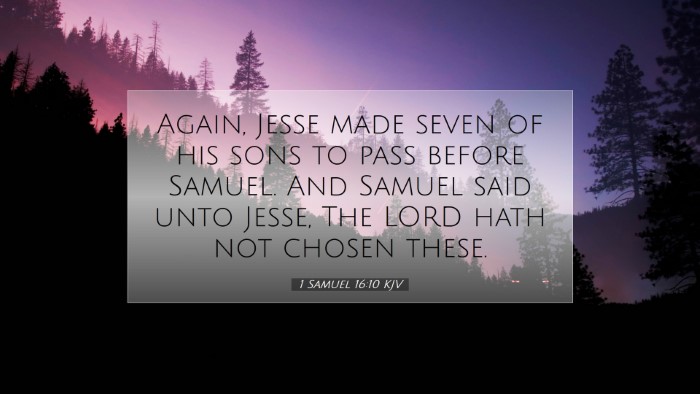Commentary on 1 Samuel 16:10
Verse: "Jesse made seven of his sons to pass before Samuel. And Samuel said unto Jesse, The LORD hath not chosen these."
Introduction
This passage encapsulates a pivotal moment in the history of Israel, showcasing God's sovereign choice in the anointing of David as king. The rejection of the seven sons reflects the divine principle that God's selection is based on the heart rather than outward appearances. This commentary synthesizes insights from prominent public domain theologians, offering a comprehensive understanding of this crucial moment.
The Context of 1 Samuel 16
The backdrop of 1 Samuel 16 is the decline of Saul’s kingship, reflecting Israel's need for a ruler who aligns more closely with God's will. The chapter opens with God instructing Samuel to anoint a new king, indicating a shift in Israel's leadership. This context is crucial as it underscores the seriousness of God's rejection of Saul and the need for a leader chosen by divine wisdom.
Verse Breakdown
-
Jesse's Seven Sons:
Jesse's presentation of his sons before Samuel symbolizes the expectations associated with family lineage and status. Each son represents potential, yet the narrative highlights that none meet God's criteria for kingship.
-
The LORD’s Choice:
Samuel’s declaration that the LORD has not chosen these sons shifts focus from human evaluations to divine policy. This notion suggests that divine wisdom transcends human understanding—an enduring theme throughout Scripture.
Theological Insights
1. The Sovereignty of God: The incident underscores the sovereignty of God in choosing leaders. Matthew Henry emphasizes that the Lord's choice is not bound by human conventions or expectations. God's selection is guided by His omniscience and purpose.
2. The Condition of the Heart: Albert Barnes notes that the heart's condition is what matters most to God. This precept aligns with God's earlier statements regarding the heart in 1 Samuel 16:7, where He emphasizes that man looks at the outward appearance, but the LORD looks at the heart.
3. Rejection and Selection: Adam Clarke points out the contrast between rejection and divine selection. This passage illustrates that God's choices can be countercultural, challenging societal norms. Saul, though initially chosen, became a cautionary tale of disobedience, emphasizing the need for true faithfulness.
Pastoral Reflections
For pastors and church leaders, 1 Samuel 16:10 serves as a reminder of the importance of discerning God's direction in leadership. The passage encourages humility and dependency on God’s vision rather than relying solely on human qualifications.
Leaders are called to look beyond superficial traits when assessing themselves and others within the community. It challenges congregations to honor those whom God raises, affirming that God's anointed may not always conform to traditional expectations.
Application for Theologians and Students
The passage is ripe for exploration in theological discussions regarding election and predestination. It raises significant questions about how God’s sovereignty interacts with human agency in the context of leadership.
Students of Scripture should engage with the text by considering the broader narrative of 1 Samuel and how it foreshadows Christ, the ultimate anointed one. This rich intertextual relation can deepen one’s understanding of God’s redemptive plan.
Conclusion
1 Samuel 16:10 invites readers into a deeper understanding of God's purposes and ways. The insights gleamed from the commentaries of Henry, Barnes, and Clarke remind us that God’s choices may seem unfathomable, but they always stem from His eternal wisdom. In a world where appearances often dictate value, this scripture invites us to seek the heart of God and trust in His divine selection.


